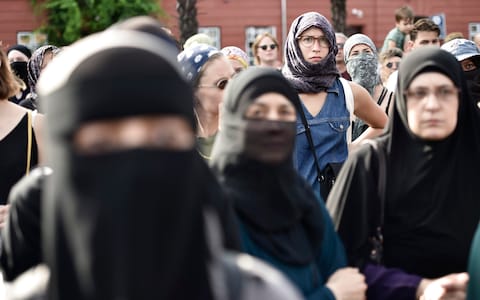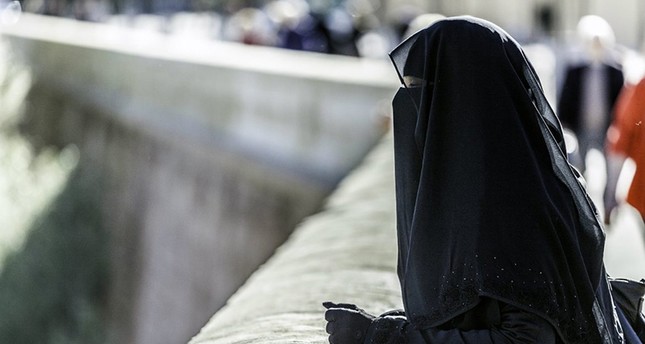Boris Johnson, the former Mayor of London and the former Foreign Secretary, spoke some words which have caught the attention of the media.
“If you tell me that the burka is oppressive, then I am with you. If you say that it is weird and bullying to expect women to cover their faces, then I totally agree – and I would add that I can find no scriptural authority for the practice in the Qur’an,” he wrote. (1)
“I would go further and say that it is absolutely ridiculous that people should choose to go around looking like letter boxes, and I thoroughly dislike any attempt by any – invariably male – government to encourage such demonstrations of ‘modesty’, notably the extraordinary exhortations of President Ramzan Kadyrov of Chechnya, who has told the men of his country to splat women with paintballs if they fail to cover their heads… If a female student turned up at school or at a university lecture looking like a bank robber then ditto: those in authority should be allowed to converse openly with those that they are being asked to instruct.”
Living in any society, it is obvious that the absolute vast majority of Muslim women, anywhere in the world, do not wear a niqab or a burqa. While the Qur’an itself advises people to dress modestly – men and women, the Qur’an does not punish anyone for over or under dressing, instead, it… asks the observer to lower their gaze. This subtle yet fundamental decree is lost in the conversations interpreting and legislating dress codes for women, most often by men, while ignoring and not legislating to the same degree dress codes for men.
In her opinion piece, British Muslim activist for women’s rights, Akeela Ahmed MBE, writes, “There are ways to debate religious attire. This is not one of them.” (2)
Similar sentiments were shared by Nazir Afzal OBE, the former Chief Prosecutor for Northwest England, managing 800 lawyers responsible for over 100,000 prosecutions a year, who said on Twitter:
“There is no religious reason for wearing Burka (it’s not allowed in Makkah pilgrimage). It’s entirely wrong for any many to impose it upon a woman. I don’t like it either. But it’s also wrong for me or politician to belittle whatever a woman chooses to wear.” (3)
To his credit, Johnson spoke about over-regulation of dress codes, criticizing Denmark’s recent ban on burkas, “If you go for a total ban, you play into the hands of those who want to politicize and dramatize the so-called clash of civilizations; and you fan the flames of grievance. You risk turning people into martyrs, and you risk a general crackdown on any public symbol of religious affiliation, and you may simply make the problem worse.” (1)

Putting Women in Danger
British politician David Lammy MP wrote on Twitter, “Muslim women are having their burkas pulled off by thugs in our streets and Boris Johnson’s response is to mock them for “looking like letter boxes.” Our pound-shop Donald Trump is fanning the flames of Islamophobia to propel his grubby electoral ambitions.” (4)
Similarly, the Muslim Council of Britain released a statement saying, “Boris Johnson rightly opposes the Danish ban on the niqab but denigrates the minority of women who chose to wear it. He described them as looking like “letter boxes” or “bank robbers” – in a language that would not be used about other faiths.” (5)
This casual double standard where it is ‘ok’ to criticize Muslim women but not ‘ok’ to criticize women of other faiths is increasingly disturbing and it may have stemmed from a subtle approach to changing tact for political gain. Previously the EU was the target with #Brexit for a rise in populism.
But once Johnson and others can no longer blame the EU for society’s ills, will immigrants be next in line for the blame? Is this part of a coordinated assault on the rich multi-faith society which we have built in the UK?
Many expressed their concerns, such as Cora Livesey on Twitter who wrote, “Am all for free speech but Boris Johnson comments on Muslim women insensitive, patronizing and unkind. Imagine if the same sort of sneering condemnation leveled at Jewish women for wearing a sheitel. There would be uproar and rightly so.” (6)
Indeed the question to ask is why is it improper, even unlawful to insult a Jewish person but negative comments on Muslim and other minorities go without similar condemnation?

Growing Hate
Labour MP John McDonnell said, “With the scale of Tommy Robinson demos, the storming of Bookmarks bookshop, and now Boris Johnson’s Islamophobic comments, we can no longer ignore the rise of far-right politics in our society. Maybe it’s time for an AntiNazi League type culture and political campaign to resist.” (7)
Writer and author Hicham Yezza observed, “Boris Johnson has been known for colorful language that can become controversial,” says #Newsnight’s correspondent – No, Boris Johnson has been known for saying racist stuff. Again & again & again. For years. With no consequences from his party except more promotions.” (8)
There is some truth in what Johnson has said: wearing a burka is not to be found in the Qur’an, that it is wrong for the Chechen president to oppress women by telling men to attack them with paintballs, and that over-regulation in Denmark is wrong. But if Boris wished to address Muslim women’s dress codes, he would take a more tactful approach and engage in conversation, debate, and dialogue.
Instead, Johnson, a seasoned politician, who knows he should be careful and selective with his words, opts to instead to use harsh language, thus detracting from the good that he said about disagreeing with the Danish position, and putting our focus instead on the bad; a mockery of the way people dress.
Some have argued that these aggressive comments are the result of Johnson having met with popular right-wing activist Steve Bannon, such as Nesrine Malik in her piece in The Guardian. Whatever the case, some find themselves esteemed in grace and so fall from it.
However in Johnson’s case, despite his best efforts, he may indeed have achieved various political offices, but he didn’t find grace. Instead, his child-like boyish platitudes while entertaining resemble a bumbling fall, and instead of lifting himself up, in a desperate attempt to identify himself as an authority and spokesman lining himself up for more political gain, he continues to fall.
What could have been positive, contributory, helpful remarks, comments, and opinions on a matter – in this case, Johnson’s remarks on over regulated Danish laws targeting unfairly the minutia of women who wear a burka – are lost as they are countered with rudeness and abuse.
Prophet Muhammad (peace be upon him) once said the best of people are the best of manners. Part of this refers to meaningful and respectful dialogue. But the Prophet also said, if you have no shame do as you wish. It is tragic that so many opt for the latter. As Akeela Ahmed MBE pointed out, “Calling women who wear a burka or a niqab a ‘letterbox’ or ‘bank robber’ is simply a cheap name-calling.” (2)
Perhaps amongst everyday people, such language is what it is, but certainly, amongst politicians and wanna-be leaders, they need to have a much higher standard in public office.